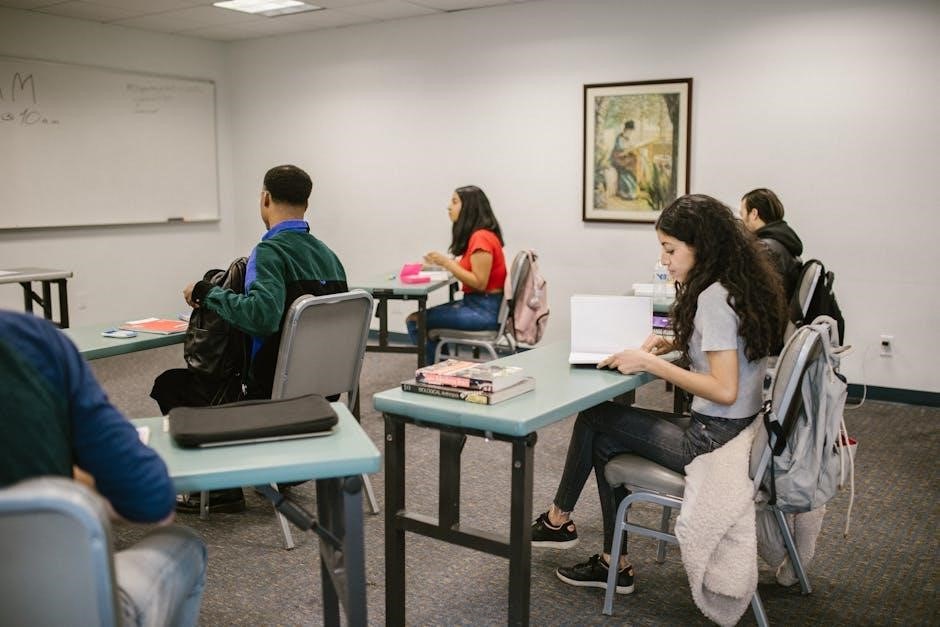
ibew journeyman lineman test study guide
The IBEW Journeyman Lineman Test is a critical certification process for electrical workers, ensuring competence in installing, maintaining, and repairing power lines․ It validates skills, safety knowledge, and adherence to industry standards, playing a pivotal role in the electrical trade․
Overview of the IBEW Journeyman Lineman Test
The IBEW Journeyman Lineman Test assesses the skills and knowledge of electrical workers in the installation, maintenance, and repair of power lines․ The exam evaluates proficiency in electrical theory, safety protocols, and practical applications․ It is a critical step for linemen to demonstrate their expertise and adherence to industry standards․ Passing the test confirms a lineman’s ability to perform tasks safely and efficiently, ensuring reliability in power distribution systems․ The test is a cornerstone for career advancement in the electrical trade․
Importance of the Test for Linemen
The IBEW Journeyman Lineman Test is essential for ensuring linemen possess the necessary skills and knowledge to perform their duties safely and effectively․ It validates their understanding of electrical systems, safety protocols, and industry standards․ Passing the test signifies a lineman’s readiness to work independently and take on advanced roles․ It also enhances career opportunities, as certification is often required for promotions and higher-paying positions․ The test serves as a benchmark for competency, ensuring reliable and efficient power distribution systems․
Understanding the Test Format and Content
The IBEW Journeyman Lineman Test evaluates knowledge of electrical theory, safety protocols, and NEC requirements․ It includes multiple-choice questions and practical scenarios to assess hands-on skills effectively․
Test Structure and Question Types
The IBEW Journeyman Lineman Test is divided into sections, focusing on electrical theory, safety protocols, and NEC requirements․ Questions are primarily multiple-choice, with scenario-based problems assessing problem-solving skills․ Practical knowledge is evaluated through hands-on simulations, ensuring readiness for real-world challenges․ Time management is crucial, as the exam duration is strictly timed․ Understanding the test structure helps candidates prioritize study areas and approach questions effectively during the examination․
Key Topics Covered in the Exam
The exam covers essential areas such as the National Electric Code (NEC) requirements, electrical theory, and practical applications․ It includes questions on voltage, current, and resistance calculations, as well as safety protocols and OSHA regulations․ Topics also encompass power systems, distribution lines, and transmission line maintenance․ Climbing techniques, tool usage, and weather-related safety measures are emphasized․ Additionally, the test evaluates knowledge of diagnostic methods, material specifications, and real-world scenario problem-solving, ensuring comprehensive expertise for linemen in the field․
Time Management and Exam Duration
The IBEW Journeyman Lineman Test typically lasts several hours, requiring careful time management to complete all sections․ Candidates should allocate time evenly across questions, focusing on their strongest areas first․ Practicing with timed mock exams helps build speed and accuracy․ Proper preparation ensures efficient use of the allotted time, maximizing the chances of a high score․ Effective time management is crucial to tackle the comprehensive exam effectively and confidently․
Eligibility Requirements and Application Process
Candidates must meet specific age, education, and work experience criteria․ The application process involves submitting required documents, paying fees, and adhering to deadlines․ Proper preparation is essential․
Qualifications Needed to Take the Test
To qualify for the IBEW Journeyman Lineman Test, applicants typically need several years of relevant work experience, often as an apprentice lineman․ Strong knowledge of electrical theory, safety protocols, and the National Electric Code (NEC) is essential․ Many candidates complete union-sponsored training programs, which cover necessary skills and prepare them for the exam․ Additionally, physical fitness and hands-on experience with tools and equipment are critical for success in this demanding role․
Step-by-Step Application Process
The application process begins with submitting proof of apprenticeship completion or equivalent experience․ Candidates must provide documentation of relevant training and work history․ Next, they register through the IBEW or an approved training center, paying associated fees․ Once verified, applicants schedule their exam date․ Final steps include reviewing study materials and ensuring all eligibility criteria are met before sitting for the test․ This structured process ensures candidates are fully prepared for the certification exam․
Associated Fees and Costs
The IBEW Journeyman Lineman Test involves specific fees, including exam registration and study materials․ Costs vary by location but typically range between $100 to $300 for the test itself․ Additional expenses may include textbooks, online practice tests, and tool purchases, with apprentices often receiving discounts․ Union membership fees also apply, contributing to overall expenses․ These investments are crucial for ensuring proper preparation and compliance with certification requirements․

Study Materials and Resources
Recommended study guides, online resources, and union publications are essential for preparation․ Utilize textbooks, practice tests, and tools like tape measures․ Subscribe to the Electrical Worker newsletter for updates․
Recommended Textbooks and Study Guides
Essential study materials include textbooks on the National Electric Code (NEC), electrical theory, and safety protocols․ Online resources like practice tests and union publications, such as the Electrical Worker newsletter, are invaluable․ Utilize tools like tape measures and sharpies for practical preparation․ Additionally, consider guides focused on lineman-specific skills and industry standards to ensure comprehensive understanding and exam readiness․
Online Resources and Practice Tests
Utilize online platforms offering practice tests, interactive modules, and study simulators to enhance exam readiness․ The IBEW website and union publications provide official study materials․ Websites like www․ibew․org offer resources, including the Electrical Worker newsletter, which aids in staying updated on industry standards․ Regular practice with online tests helps identify weak areas and improves time management․ Additionally, online forums and communities share tips and strategies from experienced linemen, offering real-world insights and exam strategies․
Utilizing Union and Industry Publications
Leverage union and industry publications to gain comprehensive insights and updates․ The IBEW provides newsletters, such as the Electrical Worker, which covers current standards, safety protocols, and exam-related content․ Industry magazines and journals offer in-depth articles on electrical theory and practical skills․ These resources ensure you stay informed about the latest developments and exam requirements, helping you prepare effectively for the Journeyman Lineman Test while aligning with union standards and professional expectations․
Key Knowledge Areas for the Test
The exam focuses on the National Electric Code (NEC), electrical theory, and safety protocols․ Mastery of these areas ensures compliance with industry standards and safe practices․
National Electric Code (NEC) Requirements
The National Electric Code (NEC) is a critical component of the IBEW Journeyman Lineman Test, ensuring compliance with safety standards for electrical installations․ It covers topics such as wiring methods, overcurrent protection, and conductor sizing․ Understanding NEC requirements is essential for linemen to ensure safe and efficient electrical systems․ Regular updates to the NEC make it vital for candidates to stay informed about the latest changes and regulations․
Electrical Theory and Calculations
Electrical theory and calculations are fundamental to the IBEW Journeyman Lineman Test, assessing understanding of voltage, current, resistance, and power․ Candidates must solve problems involving Ohm’s Law, series/parallel circuits, and transformer calculations․ Proficiency in these areas ensures linemen can troubleshoot and install systems safely and efficiently․ Regular practice with mathematical problems is essential for mastery, as electrical theory forms the backbone of lineman duties and responsibilities․
Safety Protocols and Best Practices
Safety protocols and best practices are paramount for linemen, ensuring protection from hazards like electrical shocks and falls․ The test emphasizes adherence to OSHA standards, proper use of PPE, and lockout/tagout procedures․ Candidates must demonstrate knowledge of emergency response, voltage verification, and safe climbing techniques․ Regular training and adherence to industry guidelines are critical to preventing accidents․ Mastery of these practices is essential for both the exam and real-world applications, safeguarding lives and equipment in high-risk environments․

Practical Skills and Hands-On Experience
Hands-on experience is vital for linemen, involving tool usage, climbing, and equipment maintenance․ Apprenticeships and field training provide real-world application of safety protocols and technical skills․
Importance of Field Experience
Field experience is crucial for linemen, as it bridges theoretical knowledge with practical application․ Hands-on training enhances problem-solving skills, safety adherence, and familiarity with equipment․ Real-world exposure builds confidence and competence, essential for handling live wires and complex systems․ Apprenticeships and on-the-job training provide invaluable insights, preparing candidates for the challenges of the IBEW Journeyman Lineman Test and real-life scenarios in the field․
Simulating Real-World Scenarios
Simulating real-world scenarios is vital for linemen to master practical skills․ Training programs replicate actual challenges, such as repairing live wires or handling emergencies․ These simulations build muscle memory and decision-making abilities․ By mimicking job conditions, trainees gain the confidence to tackle complex tasks efficiently․ This hands-on approach ensures they are well-prepared for both the IBEW Journeyman Lineman Test and the demands of the field, where safety and precision are paramount․
Tool Familiarity and Usage
Tool familiarity is essential for linemen, as it directly impacts efficiency and safety on the job․ proficiency with tools like tape measures, multiimeters, and toolbags is critical․ Apprentices often receive discounted rates on tools, encouraging early adoption․ Understanding proper tool usage ensures accurate diagnostics and repairs․ This hands-on knowledge is vital for both everyday tasks and the IBEW Journeyman Lineman Test, where practical skills are assessed․ Familiarity with industry-standard tools enhances problem-solving and adherence to safety protocols․
Test-Taking Strategies and Tips
Utilize time management techniques, prioritize high-weight questions, and remain calm․ Employ educated guessing, and review answers when possible to ensure accuracy and maximize scoring potential effectively․
Effective Study Techniques
Focused keyword searches and advanced Google techniques can enhance study efficiency․ Prioritize topics like NEC requirements and electrical theory, using practice tests to simulate real-world scenarios․ Organize study materials, set a structured plan, and regularly review mistakes to improve understanding and retention․ Active learning through hands-on simulations and timed exercises ensures readiness for the exam, while staying calm and managing time effectively boosts performance․
Managing Exam Day Stress
On exam day, arrive early with all necessary tools and materials․ Take deep breaths to stay calm and focus on each question․ Break down complex problems into manageable parts, and prioritize tasks to maintain composure․ Utilize prior knowledge and hands-on experience to build confidence․ Remember, thorough preparation and familiarity with safety protocols will help navigate challenges effectively, ensuring a composed and successful test-taking experience․
Reviewing and Learning from Mistakes
Post-exam, analyze incorrect answers to identify knowledge gaps․ Focus on understanding the reasoning behind each mistake, especially in areas like NEC requirements and electrical theory․ Use practice tests to reinforce weak areas and refine problem-solving techniques․ Reflecting on errors helps build a stronger foundation for future challenges, ensuring continuous improvement and mastery of lineman skills․
The Role of Unions in Lineman Training
Unions like the IBEW play a vital role in lineman training by providing structured programs, resources, and advocating for safe working conditions․ They ensure members receive comprehensive education and support․
IBEW’s Role in Workforce Development
The IBEW actively contributes to workforce development by offering training programs that equip linemen with essential skills․ These initiatives ensure a competent workforce, addressing industry needs while promoting career advancement and safety standards․ The union’s efforts foster a skilled and adaptable workforce, crucial for meeting the demands of the electrical trade․ By investing in education and safety, the IBEW strengthens the industry’s foundation, benefiting both workers and employers alike․
Union-Sponsored Training Programs
Union-sponsored training programs provide comprehensive instruction for linemen, combining classroom learning with hands-on experience․ These programs emphasize safety protocols, electrical theory, and practical skills, ensuring linemen are well-prepared for real-world challenges․ By focusing on industry standards and continuous improvement, these initiatives equip workers with the expertise needed to excel in their roles and successfully complete the IBEW Journeyman Lineman Test, while also addressing the evolving demands of the electrical trade․
Benefits of Union Membership
Union membership offers numerous advantages, including higher wages, quality healthcare, and enhanced job security․ Unions advocate for better working conditions, safety standards, and fair compensation, ensuring members are protected and valued․ Additionally, unions provide access to training programs and professional development opportunities, which are crucial for preparing for the IBEW Journeyman Lineman Test․ This support system not only benefits individual workers but also strengthens the overall electrical trade by fostering skilled and dedicated professionals․

Professional Development and Career Advancement
The IBEW Journeyman Lineman Test opens doors to career advancement, enabling linemen to pursue specialized roles and leadership positions․ Union-supported training and continuous education further enhance professional growth․
Continuing Education for Journeyman Linemen
Continuing education is essential for journeyman linemen to stay updated on industry advancements and safety protocols․ The IBEW offers specialized training programs, workshops, and resources to enhance skills․ Union publications, such as the Electrical Worker newsletter, provide valuable insights and updates on NEC changes, new technologies, and best practices․ These opportunities ensure linemen maintain expertise and adapt to evolving industry demands, supporting long-term career success and safety in the field․
Opportunities for Specialization
Journeyman linemen can pursue specialized roles like transmission line specialists, substation technicians, or renewable energy installers․ These niches require advanced training and certifications, often offered through IBEW programs․ Specializing enhances career growth, increases earning potential, and allows linemen to work on complex projects․ Union resources and industry partnerships provide access to cutting-edge training, enabling linemen to adapt to emerging technologies and expand their expertise in high-demand areas of the electrical trade․
Networking and Mentorship
Networking and mentorship are vital for professional growth in the lineman trade․ Union events, workshops, and conferences provide platforms to connect with experienced professionals․ Mentorship programs, often facilitated by IBEW, pair apprentices with seasoned linemen, offering guidance and hands-on learning opportunities․ These relationships foster skill development, safety awareness, and career advancement․ Building a strong network within the trade enhances job opportunities and ensures access to industry insights, supporting long-term success in the field․

Real-Life Experiences and Testimonials
Certified linemen share inspiring stories of overcoming challenges and excelling in their careers․ Many highlight the test as a transformative step, showcasing dedication and expertise in the field․
Success Stories from Certified Linemen
Certified linemen often share stories of how passing the IBEW Journeyman Lineman Test transformed their careers․ Many highlight the rigorous preparation and dedication required, emphasizing the test’s role in validating their expertise․ These success stories inspire aspiring linemen, showcasing the positive impact of certification on career advancement and earning potential․ They also underscore the importance of perseverance and the rewards of achieving this prestigious certification in the electrical trade․
Challenges Faced During the Test
The IBEW Journeyman Lineman Test presents several challenges, including time constraints, complex question formats, and the need for in-depth knowledge of electrical theory and NEC standards․ Applicants must apply theoretical concepts to real-world scenarios, which demands strong problem-solving skills․ Additionally, the test’s emphasis on safety protocols and practical applications requires a blend of book knowledge and hands-on experience․ Managing exam-day stress while maintaining focus is crucial, as the test evaluates both technical expertise and the ability to perform under pressure․
Lessons Learned from the Exam Process
Candidates often highlight the importance of thorough preparation and time management during the exam process․ Understanding the test format and focusing on high-weightage topics like NEC requirements and electrical theory is essential․ Many emphasize the value of hands-on experience and simulating real-world scenarios to build confidence․ Additionally, stress management techniques and regular practice with past papers prove crucial․ The exam process underscores the need for a disciplined study routine and leveraging union resources for comprehensive preparation․

Exam Day Preparation and Post-Test Actions
Ensure all documents are ready, arrive early, and stay calm․ Post-test, review results, understand scoring, and plan next steps based on outcomes․
Final Preparations Before the Test
Review study materials, ensuring familiarity with NEC, electrical theory, and safety protocols․ Rest adequately, eat well, and double-check test location and required documents․ Plan to arrive early to avoid stress․
Interpreting Test Results
Test results determine certification eligibility, with a passing score typically around 70%․ Candidates receive a detailed score report highlighting strengths and areas for improvement; Passing the exam validates expertise and safety knowledge, enabling career advancement․ Those who fail can retake the test after a specified period, usually 30 days, allowing time for additional preparation and review of weaker areas;
Next Steps After Passing the Exam
Passing the IBEW Journeyman Lineman Test marks a significant career milestone․ Certification is awarded, enabling professionals to work on high-voltage systems and advanced projects․ Many join IBEW union programs for enhanced benefits and job opportunities․ Continuing education is essential to maintain certification and stay updated on industry standards․ Specialized training in emerging technologies, such as renewable energy systems, can further expand career prospects․ Networking with experienced linemen and mentors is also crucial for long-term success and professional growth in the field․